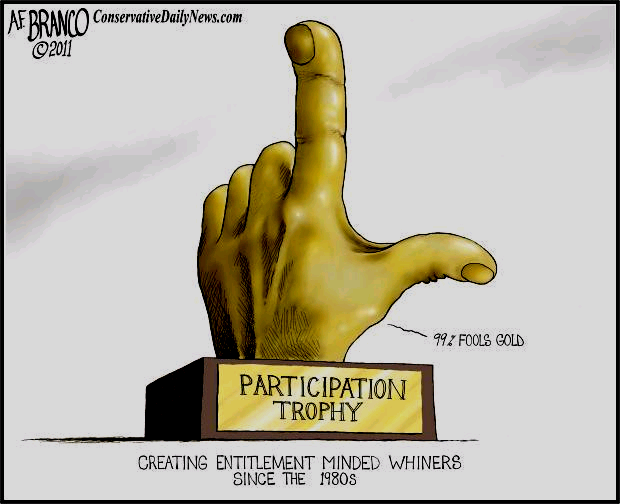The prominence of youth sports in the United States has proven to have an effect on the way that children have been treated. In youth sports, it is a common act to reward children with a trophy even when they don’t place in first, and therefore, they would be rewarded with a participation trophy. Too many trophies— especially when they don’t actually resemble success and victory— are often times perceived as a bad thing. “According to HBO”, says Evan Grossman, author for Men’s Journal, “there has been a seismic shift in American culture in an effort to make each child feel special. The mentality has created an atmosphere where everyone gets a trophy, but awarding medals and trophies just for participation sets the bar very low”. Grossman’s comments on the shift in American culture may be attributed to the fact that children are getting rewarded for not succeeding, which in turn sets the bar lower than it previously has been. With a lower level of competition, it is easier for the children to feel special knowing that they may be fully supported regardless of the outcome. However, that full support isn’t a bad thing in the eyes of many— the stance on whether rewarding children for their technical failure is right or wrong has two sides to it— other scientists and writers think that children need the positive reinforcement in order to help them properly develop. “There has been a seismic shift in American culture in an effort to make each child feel special. The mentality has created an atmosphere where everyone gets a trophy, but awarding medals and trophies just for participation sets the bar very low”
Many believe that children should receive participation trophies because being rewarded for playing sports in particular, can positively affect aspects of personal development among them, such as building self esteem, setting goals, and developing future leadership qualities. Additionally, for kids who do receive a trophy for participating, it may go a long way in increasing their confidence and future success in their if they are lacking various means of support or attention.
However, there are many others who believe that participation trophies are not beneficial for children in youth sports and are essentially setting up kids for failure in life, and that rewarding kids just for participating can have a negative impact, producing a self-obsessed, irresponsible, and unmotivated generation of false achievers. As kids get older it becomes concerning the amount of rewards they get for only participating. Kids need to learn the concept of losing and many believe if they do receive participation trophies, they will not experience the feeling of losing, but are given the false stimulation of succeeding. The general problem regarding the topic of participation trophies is teaching kids the right things and good work habits when they grow up, and help them become educated and prepared for the real world.
Due to the prevalent fact that there are many different opinions on if or how participation trophies should have an impact on youth sports, an important question to ask is how do participation trophies actually have an effect on children who play youth sports? This is a question that has been explored by many journalists, research studies, the media, and various other sources, and additionally finding out how topics such as praising effort, extrinsic and intrinsic motivation, and how it will have an effect on children once they grow and develop in the real world.
Alexandra Cox: There Are Positive Effects of Rewarding Effort by Handing out Participation Trophies |
Tyler Rohan: Emphasizing Intrinsic and Extrinsic Motivation |
Zavier Williams: Parents and Coaches Involvement with Participation Trophies |
Marcus Willoughby: Losing is Essential to Winning |
Additional Resources |
